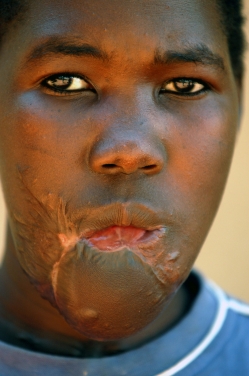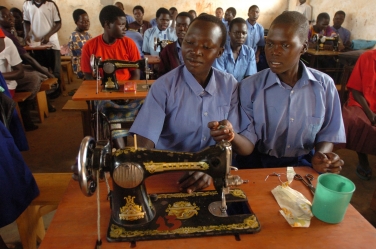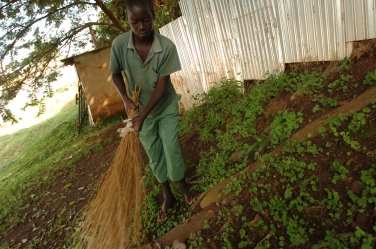 |
GULU
July 2006 |
 |
|||||||||
|
The traffic is chaotic in Kampala. In the beginning I am holding on, white knuckled, convinced that the next car, making a hairpin turn right in front of us with only inches to spare, will misjudge its wild ride down the street and come crashing into us. Incredibly, nothing happens. There are so many cars, all in their own imaginary lane, driving down the two-lane street. In a mechanical ballet of cars breaking, accelerating and swiftly turning, they all manage to get where they want to go, and nobody seems alarmed by the constant close calls. There are no accidents on my trip that day. Not that that's always the case; I learned before traveling to Uganda, a small African country tucked in between Kenya, the Democratic Republic of the Congo, Sudan and Tanzania, that the biggest risk a foreign traveler runs in the country is to get injured in a car accident. Because of that, I have purchased my very own emergency airlift insurance, so that in case the driver doesn't manage to break fast enough for that large cow that just stepped out in front of the car barreling down a one-lane dirt road full of potholes and people, I can get to a hospital in Nairobi. But I don't have to use it.
The school is full of children eager to learn; the air is always filled with small hands wanting to get the chance to answer the teacher's questions. The lesson is conducted in English, which is the official language, although in every town I visit yet another tribal language is spoken and towards the end of my trip I will be able to say "thank you" and "how are you" in at least four different ways.
It is hard to photograph during recess when I find myself to be quite the tourist attraction. Somehow I manage to slip away and I am able to photograph the older girls playing an interesting combination of soccer and football. What strikes me most about these children is how happy they seem--so resilient after all that has happened to them. Many of them fight an uphill battle against HIV but the only message they wish to pass on to American schoolchildren is how much they love school and look forward to the future. The teachers are so dedicated and loving; they are trying to make a better life for these children society has largely forgotten.
After rushing back to Kampala on the same road on which I came with the same driver who loves speed, I arrive safely in Kampala just in time to get my army clearance for the next day's journey to Gulu. Even though the office was supposed to be open until 5 p.m. the man in charge has already left. It took some convincing but I get the secretary to make a few phone calls and she reaches the general over the phone and somehow manages to get my clearance. I am all set to go. I am told that the main road up to Gulu is patrolled by the Ugandan army, and should be safe. The Lord’s Resistance Army, led by Joseph Kony, is known for ambushing, among other things, cars. He is also the reason I am going to Gulu.
During the last 20 years he and his "army" have kidnapped over 20,000 children and turned them into child soldiers and sex slaves. The majority of them never see their families again. I am going to Gulu to tell their story, and that of the so-called "Night Commuters," the thousands of children who night after night, year after year, walk from the villages where they live into the city of Gulu in search of a safe place to sleep so they won't get abducted by the LRA. There are big guarded fenced-in centers with large tents where the children sleep directly on the plastic floor with only a blanket to cover them. They do not get any food there. In the morning they rise early to walk back home, some stopping for breakfast before continuing on to school. Most of them have done this their entire life.
One of the other female participants hasn't been able to reach her husband who is on a business trip to New York City for a few days. I suggest she calls her answering machine at home to see if there are any messages for her. There is one: her husband has been in a serious car crash and is in the ICU with head trauma. Is there a worse place to get such news? She is a long car ride from Kampala and once there, at least a 24-hour trip to New York. I do what I can to console her and help her get on the next flight out with the help of our workshop coordinator, who is back in Kampala and makes the reservation. She is being really strong but I cannot even imagine what she's going through.
She leaves at daybreak and the five of us who remain set out to our various places to shoot. I am at GUSCO, a rehabilitation center for former child soldiers by 7 a.m., but the man who was supposed to be there and let us in is not. We wait. We wait. We wait some more. After 9:30 a.m. he finally shows and I am taken to an office where I conduct an interview with him and get some instructions on how to work with the children, all of whom have gone through incredible trauma. Most (male) children have been forced to kill people when they ambush villages in search of food and other children to kidnap. The girls are mostly kept as sex slaves for Kony and his commanders. I spend just about an hour photographing the children doing their chores and playing. Then I get a call from our teacher, he tells us all to come back to the hotel. It turns out that the American Embassy has put out a warning about traveling in the region and all the NGOs have canceled traveling. The Workshop has decided that the situation is so grave that they want us to return immediately to Kampala. We have the option of staying but we have to sign a paper saying we're withdrawing from the workshop and staying at our own risk. The other professional photojournalist, Michelle from Arkansas, and I decide to stay. I had come that far to tell the story and I really wanted to finish what I came to do. So the teacher and the three male participants leave for Kampala and Michelle and I remain by ourselves.
I go back to GUSCO and spend the afternoon there and in the evening I photograph the children walking into Gulu and to Noah's Ark, one of the shelters in the city. The center has a study hall where the children can do their homework. There is singing and dancing to keep them entertained before they settle in for the night. It is time for us to hit the sack too.
The next day will be another early morning. I return to GUSCO where this time I manage to get in early and make morning shots of the children brushing their teeth that I missed the day before because I was waiting in the car. Brushing their teeth is one of the habits the children have had to relearn after years of living in the bush. After wrapping up at GUSCO we make a quick stop at one of the IDP camps (Internally Displaced People) before heading back to Kampala. Here and there we see national soldiers patrolling the road and we make it out of the northern region safely. Shortly thereafter the car overheats and we get stranded on the side of the road. Some people with water buckets magically arrive and agree to fetch water for us and with the car happily refreshed, we successfully reach our hotel in Kampala.
© Bea Ahbeck
Dispatches are brought to you by Canon. Send Canon a message of thanks. |
||||||||||
Back to July 2006 Contents
|
|



